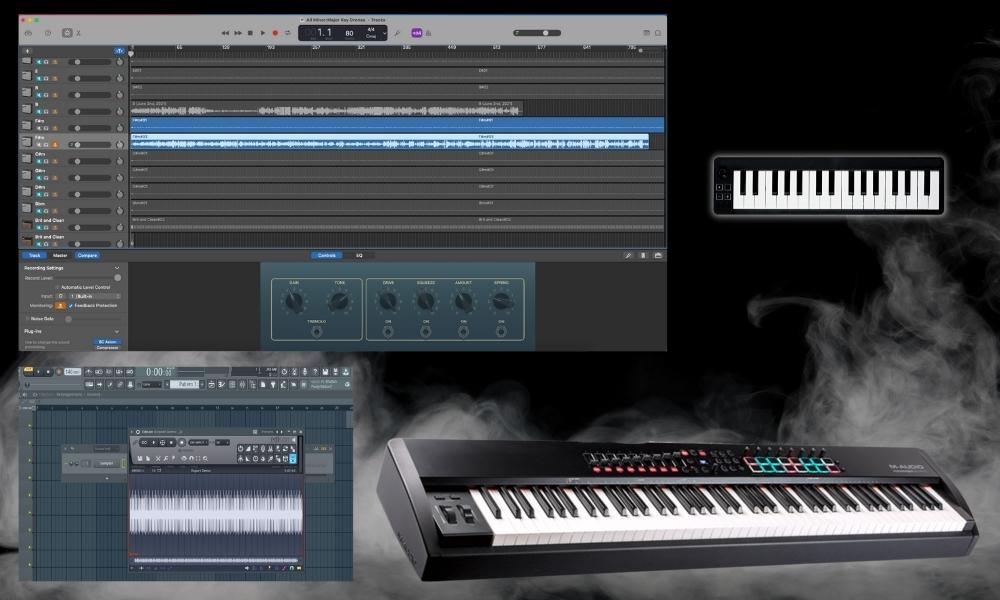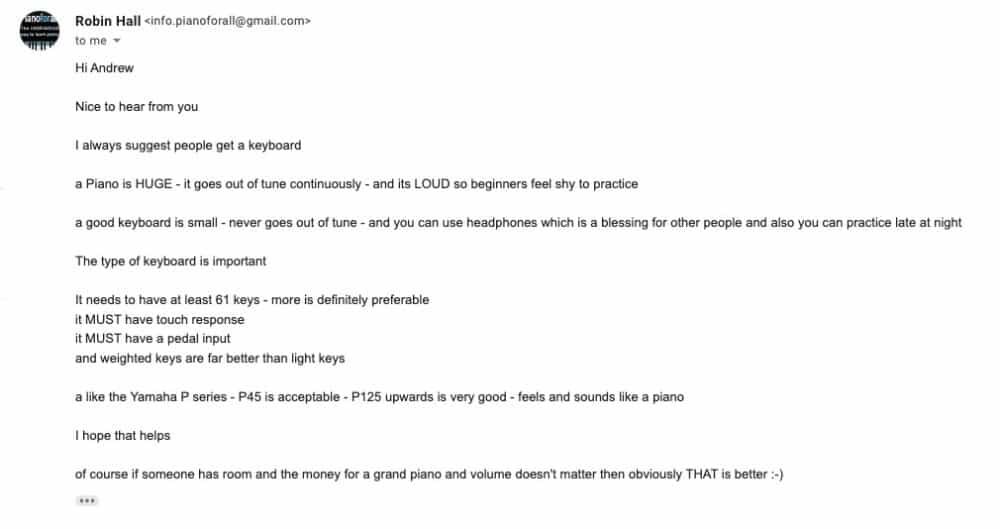One thing I always see online is how music theory is a “set of rules,” (which it isn’t), and another is that you need a piano, guitar, flute, – (insert whatever instrument here) – to learn. I’ve heard people say on forums that you need a piano to learn theory, but that isn’t true either.
Generally speaking, you don’t need a piano to learn music theory because it’s applicable to any melodic instrument, although, some instruments are better than others. Additionally, you can learn music theory concepts just by studying with pen and paper, so an instrument isn’t always necessary.
Reasons You Don’t Need a Piano to Learn Music Theory
1) You Can Learn on Other Instruments
The main reason why you don’t need a piano to learn music theory is that it’s applicable to any instrument that uses standard notation, which is all of them to some degree. Unless you’re using some type of instrument that has micro-tonal notes, or some other niche instrument I’m unaware of, then you should be in the clear.
I learned most of what I know as a guitarist. But I did start taking piano lessons when I was really young. I think I was 7-years-old when I started to take piano lessons and then I transitioned into the guitar when I was 10 or 11-years-old. While the guitar was a great medium for me to learn with, there were some limitations along that path.
The first is that the guitar almost exclusively uses the treble clef. At least in all of the materials that I used to learn. There are 6 different clefs to my understanding, the bass clef, treble clef, soprano clef, alto clef, baritone clef, and the tenor clef.
![All of the Clefs - Why You Don't Need A Piano to Learn Music Theory [ANSWERED]](https://producersociety.com/wp-content/uploads/2022/03/All-of-the-Clefs-Why-You-Dont-Need-A-Piano-to-Learn-Music-Theory-ANSWERED.jpg)
And there are instruments that predominantly use each clef. However, you can actually use whatever clef you want for each instrument. For instance, there’s nothing stopping a guitarist from using the bass clef if he or she wanted to. But I feel like it would be a bit odd.
And you would have to go out of your way to learn it in that way. This plays into the reason why many people recommend you learn the piano first before any other instrument. The reason is you familiarize yourself with the bass and the treble clef while learning standard notation on the piano.
There’s no way to cheat learning the piano because there is no tablature like there is on the guitar. “Cheat” is probably the wrong word, but what I mean to say is there is no way around learning standard notation if you’re going to take up the piano.
Unless you just want to learn how to play riffs, licks, and songs by ear (which would be pretty inefficient but not impossible) it’s best to learn how to read music. This is one reason why almost every pianist can read music but hardly any guitarist knows how to read music. At least most guitarists I’ve met can’t read music.
Anyway, after you’ve learned how to read the treble and the bass clef, you already understand the language by which most instrumentalists communicate via standard notation. Many instruments use either one of these clefs, so the piano is a great start.
2) You Can Learn Music Theory With No Instruments
![Mark Sarnecki's Complete Elementary Rudiments - Why Do Some Pianos Start With A C and Not an A [ANSWERED]](https://producersociety.com/wp-content/uploads/2022/03/Mark-Sarneckis-Complete-Elementary-Rudiments-Why-Do-Some-Pianos-Start-With-A-C-and-Not-an-A-ANSWERED-1.jpg)
While it’s certainly a lot easier to learn music theory if you’ve got an instrument nearby, whether it’s a piano, guitar, or a flute, you don’t really need one to get started.
You could just get Mark Sarnecki’s Complete Elementary Rudiments and the Answer Book and begin your studies right away.
However, if you’re totally new to it, I would recommend getting Punkademic’s All-Access Pass from their site and then start with their Music Theory Comprehensive Complete Course.
Coupled with the two books from Mark Sarnecki, you have enough material to get a handle on the rudiments of theory (and more).
Here’s a list of everything you can learn from Mark Sarnecki’s book, for instance, without even having an instrument.
- Time Values
- Music Notation
- Major Scales
- Semi-Tones, Whole-Tones, Accidentals
- Chromatic Scales
- Minor Scales
- Pentatonic Scales
- Whole-Tone Scales
- The Octatonic Scales
- The Blues Scales
- Identifying Scales
- Modes
- Simple Time
- Intervals
- Hybrid Meters
- Compound Time
- Dominant 7th and Diminished 7th Chords
- Chords
- Transposition for Ochestral Instruments
- Short and Open Score
- Cadences
Check my guide on how to learn the fundamentals of theory, read through it carefully, and get started. There are a lot of other resources you can take a look at as well, particularly for later in your journey, once you’ve really grasped the fundamentals.
For instance, a lot of musicians hail Mark Levine’s Jazz Theory book as a great one, and Jane Piper Clendinning’s The Musician’s Guide to Theory and Analysis is another one.
I would recommend going through these other two ones after Sarnecki’s book and the Punkademic course.
3) You Can Use A MIDI Keyboard and a DAW

Like I’ve talked about in this guide on learning the piano with 25 keys, you can actually use a MIDI keyboard to learn the fundamentals of the piano. Sure, it’s not the absolute best way of learning the piano, but you’ll at least familiarize yourself with the most important things like the names of the keys.
On the other hand, if we’re talking about a full 88-key controller like the M-Audio Hammer 88 Pro, then there really is no limitation at all in terms of learning the piano. Because it has everything that you need.
The only thing about it is that you need to turn your computer on and open a DAW to get sound from it because it’s a controller, not a piano. If you want to just turn it on and start playing without a computer, the Yamaha P125 I’ll mention in a second is a better move.
Important Things to Note About Learning Music Theory and the Piano
1) You Don’t Need A Piano to Learn Music Theory But It Is Great For It
In my guide on why learning piano on your own, and my article comparing the piano and the guitar, I explained a couple of the reasons why the piano is so useful. You don’t need it to learn, but I would say it’s probably the best instrument to start with if you’re serious about learning. I say this as a guitar player as well.
Don’t get me wrong, I love the guitar, but I think the piano is a better move (PianoForAll is a great start if you want to learn by the way).
Once I started learning the piano on my own, I feel like it helped me understand some of the concepts that eluded me when I was applying them to the guitar. One great example is modes, chord construction, and scales.
Because of the way the piano is laid out, you can clearly see the key signatures, scales, and intervals in a way that’s easily digestible.
Compare this to the guitar which is more of a labyrinth, in my honest opinion, due to the differently-tuned strings. Some of them are tuned a 4th apart while others are tuned a 3rd apart.
If you are interested in getting your first piano, I have to defer to the creator of PianoForAll who emailed me and said that the Yamaha P125 and upward was a great model for someone who’s looking to learn.


 Written By :
Written By :